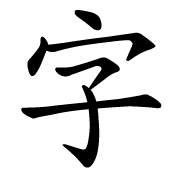Nama kehormatan (Hanzi: 字; Pinyin: zì; harfiah: 'character'), juga dikenal sebagai nama gaya,[1] merupakan sebuah nama yang diberikan kepada seseorang saat dewasa selain nama pemberian.[2] Nama kehormatan ini merupakan tradisi di lingkungan kebudayaan Asia Timur, termasuk Republik Rakyat Tiongkok, Jepang, Korea, dan Vietnam.[3]
- ^ Tianjun Liu, Xiao Mei Qiang (2013). Chinese Medical Qigong. hlm. 590. ISBN 978-1848190962.
Mencius (371—289 BCE), born in Zou county (Shandong province), first name Ke, style name Zi Yu, was a famous philosopher, educator, politician, and expert on the Qigong life nurturing of Confucius in the Zhanguo Period.
- ^ Origins of Chinese Names. 2007. hlm. 142. ISBN 978-9812294623.
In ancient times, besides having a surname and a given name, one would have a courtesy name "Zì" as well. The courtesy name was the proper form of address for an adult. On reaching 20 years of age, young men would "put on the hat" as ...
- ^ Names of Persons and Titles of Rulers

